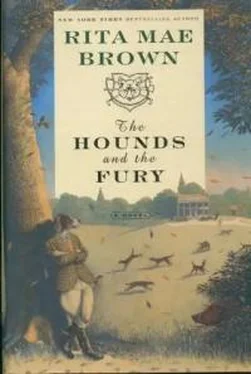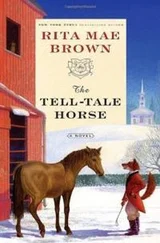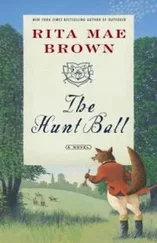They were big, they were beautiful. That part would swell his ego. Maybe he should just mount up and parade them around until he could find a real huntsman.
As she passed the beginnings of the stone St. Swithun’s Chapel she had ample time to consider the unholy mess Crawford was creating for himself—and for her, too.
“Happy New Year.” She sighed.
As she drove through the imposing gates, two huge bronze boars guarding the entrance had icicles dangling from their snouts. Their bristly chests glistened with ice rivulets. She turned west.
A quarter mile down the road she noted Donny Sweigart’s treads from last night’s supposed deer hunt.
Curious, she pulled as far off the road as she could given the conditions, hit her flashers, and got out. She wanted to see if there was a carcass or deer offal in the snow. She looked down the slight embankment, then over the expanse of snowy meadow. A copse of trees and shrubs stood out against the white. Something bright caught her eye.
She slid down the embankment. Tracks were partly covered with snow, but she could make out boot marks. She followed them toward the copse. Once there she saw a glob of congealed blood, fist sized, bright red.
There were no signs of struggle, no feathers either. If Donny had set out a trap she’d see it. No trap.
It was eerie, a hunk of frozen blood. She returned to her truck wondering what the hell was going on.
CHAPTER 10
Ben Sidell slouched in the passenger seat of Sister’s red GMC early Monday morning, January 2, St. Basil’s Day. “Take me to Paradise.”
“If I were young, I would,” she sassed back.
He laughed as he unrolled the map on the dash.
These expensive, lovely maps had been donated to the Jefferson Hunt by Francis McGovern, a buoyant member more on the road than home to hunt.
“Apart from the home fixtures, how old are the fixtures adjacent to Paradise?”
“Mill Ruins, Mud Fence, Orchard Hill, Chapel Cross are original fixtures going back to the beginning of the hunt. Course they’re older than 1887, but once the hunt was founded their landowners were part of the fun. What’s happened in certain parts of the county, especially the east because it’s closer to town, is large estates, over time, have been broken up. Newcomers don’t understand foxhunting or they plain don’t like it, and we lose, say, fifty acres, which make the one thousand acres we use to hunt unhuntable for practical purposes because we can’t get around the fifty acres. Even if we do figure out a way around, hounds can’t read. They go through the No Trespassing area and you get an enraged phone call, Sheriff.”
“In time some of the comeheres change their minds.”
“Some.” She nodded. “But there are other people who just don’t get it and never will. They want to live in the country, but they aren’t of the country. Pretty much they look down their noses at us.”
“Do they look down at people like Tedi and Edward Bancroft?”
The Bancrofts had been wealthy since the Industrial Revolution, the family wise in nurturing that wealth.
“The comeheres don’t even know they’re not in the loop. If they see Tedi and Edward at a big party they think they’ve made it. Know what I mean?”
“I think so,” said Ben. Originally from Ohio, he had been hired three years earlier to be sheriff of the county.
“It boils down to this: the arrogant ones only talk to other arrogant ones. They’re ignorant of their social status. They think because they’ve built a McMansion on twenty acres, they’re elite—if you can stand that word. They haven’t a clue that they’re close to the bottom of the barrel. A poor but warm person from an old family has much higher status than they do.”
He smiled wryly. “You’re at the top of the heap.”
“Not in wealth but in other respects, yes. No point in false modesty. And the reality is, if you’re of it, you don’t dwell on it. I mean by that, you take it for granted. Maybe the first lesson new people need to learn is to treat people with respect regardless of their bank balances.”
“Yep.”
She slowed. “Okay, here’s Chapel Cross. Orchard Hill and the other fixtures all fan out from this crossroads, an old tertiary road in highway department terms. Everything you see, I’ll drive slowly, is our territory right up to the Blue Ridge. The top of the mountains divides us from Glenmore Hunt in Augusta County.”
“Why don’t you go up the mountains?”
“Would you?” She laughed. “For one thing, it’s hard going. For another thing, there’s boar up there, and I fear them like death. Lastly, there are folks in those hollows who come to town maybe once a year. They are famous for the purity of their country waters.”
He knew about the distilleries in the hollows but not their location. Most moonshine busts were made when a trucker was pulled over and moonshine was discovered in the rig’s closed bed.
Also, no prudent sheriff in any county would send a lone deputy to seek out the stills.
“Let me go back for a minute. Some of the new people really are good. They take to hunting, they value wildlife, they are good stewards of the land, and we’re lucky to have them. We’re lucky, too, because they’re usually more liberal, politically, than we are and they challenge us, force us to question. I believe that’s a good thing. If all you do is converse with people who think just like you do, you don’t learn much.” She slowed again, pointing to a lone brick fireplace. “Used to be the gatehouse to Paradise.”
The gatehouse pillars, brick with a shield of arms near the capped top, still stood.
“Are you going to tell me the Yankees burned it?”
“No.” She laughed a deep appreciative laugh. “Not this one. Way back before you were born, electrical wire was wrapped in silk. Anyway, a short burnt it to a cinder. The big pile with towering Corinthian columns is at the end of this road. It was incredible. It survived 1865, but each year it fell further and further into disrepair.” She paused. “Thanks to Margaret’s efforts, we’ll be back hunting here. You’ll see it Saturday. Decayed as it is, there’s magic to Paradise. God, what it must have been in its heyday.”
“Why did Margaret help?”
“Walter and Jason asked her to do it, and she likes to see the hunt. She’s just not a hunter. Golf is her game.” Sister paused. “Just one of those things. Binky and Alfred had another major disagreement—not face-to-face, of course, but through their lawyers—so the lawyers suggested no hunting because of the liability. Alfred’s always been warm to hunting, and, really, Margaret worked on her father. Once lawyers get in anything it’s a mess.”
“Yeah,” Ben agreed.
“In a way this is still paradise. There’s a forlorn majesty to the ruin.” Sister felt the pull of the place.
“Where are we, about four miles north from Chapel Cross?”
“Right. Good judge of distance. If we turned around, passed through Chapel Cross, we’d reach Tattenhall Station. From Chapel Cross, Little Dalby and Beveridge Hundred are on the south and west side of the road. Orchard Hill and Mud Fence are on the south and east side. Tattenhall Station is straight south. Paradise is five thousand acres, and it covers both sides of the old road north of Chapel Cross. Beyond Paradise it’s billy-goat land owned by Franklin Foster in northern Virginia. At long last, he’s given us permission to hunt there. Walter and I drove up to Fairfax to see him last summer. With the leaves off the trees and snow on the ground, you get a good sense of how the land rolls. All crisscrossed by creeks. It’s good soil. Some of the grades might scare you on a tractor, though.” She laughed.
Читать дальше












